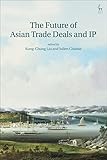The future of Asian trade deals and IP
Material type: TextPublication details: London Hart 2019Edition: 1st edDescription: ix, 306p. 25 cmISBN:
TextPublication details: London Hart 2019Edition: 1st edDescription: ix, 306p. 25 cmISBN: - 9781509922772
- Introduction: The Intersection between Intellectual Property Rights and Free Trade Agreements
- FROM TPP/CPTPP TO RCEP
- Selecting the Right Representatives to Participate in Trade Negotiations: A New Model of Multi-Stakeholder Involvement for Future Plurilateral Free Trade Agreement Negotiations
- Trade Strategies and Power Games between China, the US and India
- The Future of China's Trade Pact and Intellectual Property Rights
- The RCEP Negotiations and Asian Intellectual Property Norm Setters
- INVESTOR-STATE ARBITRATION AND INTELLECTUAL PROPERTY
- Recalibrating the Balance in International Investment Agreements
- Issuance of Compulsory Patent Licences and Expropriation in Asian BITs and FTA Investment Chapters: A Study of India, China, Malaysia and Thailand
- IMPROVING THE IP PROVISIONS OF CPTPP/RCEP AND REDEFINING GLOBAL IP
- Will RCEP Redefine Norms Related to Pre-grant Opposition and Experimental Use Exceptions in International Patent Law?
- Patent Term Extension in the Pharmaceutical Sector: An Asian Comparative Perspective
- Mitigating the Impacts of Patent Linkage on Access to Medicine: Some Asian Experiences and Suggestions
- Intellectual Property in Plant Material and Free Trade Agreements in Asia
- Pre-established Damages for Copyright Infringement and Trademark Counterfeiting: Suggestions for CPTPP/RCEP Based on Some Asian Experiences
- Liberalizing Use of the Three-Step Test and Copyright Limitations in the Public Interest
- Intellectual property -- Asia
- Foreign trade regulation -- Asia
- International Economic & Trade Law
- Asian Law
- 347.77 LIU
| Item type | Current library | Call number | Status | Date due | Barcode |
|---|---|---|---|---|---|
|
|
IUCIPRS General Stacks | 347.77 LIU (Browse shelf(Opens below)) | Available | IPR4679 |
The pulling out of the Trans-Pacific Partnership (TPP) by the US marks a new era for trade deals and potentially for intellectual property (IP). The TPP has evolved to become the Comprehensive and Progressive Agreement for TPP (CPTPP) with the remaining 11 members suspending some of its provisions, over half of which are IP-related. While the TPP excludes the two Asian giants – India and the People's Republic of China (PRC) – the ongoing Regional Comprehensive Economic Partnership (RCEP) negotiations include both of them.
The first part of this edited collection sets out to re-examine some basic principles of trade negotiation, such as choosing the right representatives to negotiate and enhancing transparency as a cure to the public's distrust against trade talks; moreover, it analyses how CPTPP might impact on RCEP's IP chapter and examines the possible norm setters of Asian IP. It then focuses on the PRC's trade and IP strategy against the backdrop of the power games between the PRC, India and the US.
The second part of the book reflects on issues related to investor–state dispute settlement and its relationship with IP, such as how to re-calibrate the balance in international investment arbitration, and whether compulsory license of IP constitutes expropriation in India, the PRC and select ASEAN countries.
The third part of the book questions and strives to improve some of the proposed IP provisions of CPTPP and RCEP and to redefine some aspects of international IP norms, such as: pre-grant patent opposition and experimental use exception; patent term extension; patent linkage and data exclusivity for the pharmaceutical sector; plant variety protection; pre-established damages for copyright infringement; and the restructuring of copyright limitations in the public interest.


There are no comments on this title.